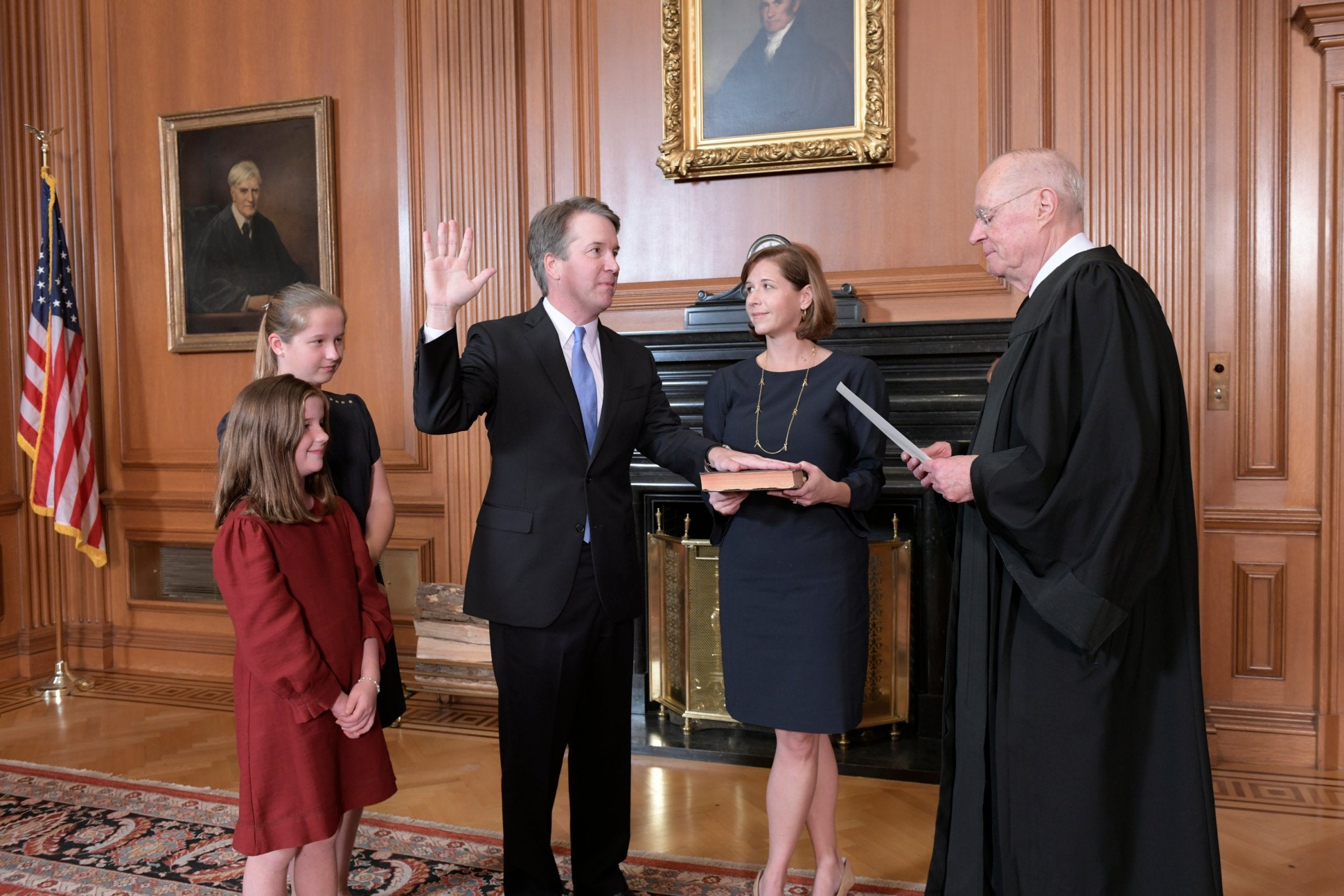Brett Kavanaugh: How could Trump's new Supreme Court justice shape battles over abortion rights, gun control, and impeachment
Confirmation likely to push America’s highest court to the right for a generation and give Republicans swing vote in ideologically charged legislation

Brett Kavanaugh’s confirmation to the Supreme Court on Saturday is widely expected to swing America’s highest court to the right for generation.
He was appointed in spite of accusations of sexual assault and amid questions over his impartiality, stoked further when he launched a blazing attack on Democrats questioning him.
Though he demurred during his confirmation hearings when asked how he would vote on controversial topics from abortion rights to impeachment he is expected to be a key swing vote for Republicans.
Abortion rights (Roe v Wade)
The ruling which guaranteed women in all states access to abortion is under regular attack from conservative and religious groups. There are regular test cases brought to the Supreme Court which could be used to weaken or overturn the original ruling.
Mr Kavanaugh is likely to occupy the deciding vote in future cases and has said he sees previous judgements uphold these rights as “important precedent”. This was enough to reassure Republican senator Susan Collins, a deciding vote in his confirmation, to back Mr Kavanaugh.
However President Trump has repeatedly said he would appoint justices to overturn Roe v Wade and Mr Kavanaugh declined to say, during his hearings, what he would do if such a case came up.
In a 2017 opinion as a Washington DC circuit judge Mr Kavanaugh opposed a decision to allow a girl who was an undocumented minor in the government’s care to have an abortion, and may well support changes that increase red tape or delays in accessing treatment.
He has also opposed Obamacare principles which required religious organisations to provide contraception to employees, saying this infringed their religious liberties.

Gun control
Mr Kavanaugh may resist cases seeking to restrict or limit the “right to bear arms” set out in the second amendment.
He has opposed the District of Columbia’s ban on semi-automatic rifles. In a 2011 opinion he said the constitutional protections afforded to semiautomatic handguns should be logically extended to the high powered assault weapons and DC’s ban was unconstitutional.
Mr Kavanaugh was pressed on this objection during the Supreme Court nomination process and said that “semiautomatic rifles are widely possessed in the United States”.
“That seemed to fit common use in not being a dangerous and unusual weapon.”
Semi-automatic rifles, modified with a “bump stock” which allows the weapon to be continuously fired without releasing the trigger between shots, were used in the massacre of 59 people in Las Vegas in 2017.
Investigation into Russian collusion and impeachment
Another reason suggested for the president’s backing of Mr Kavanaugh is his belief in executive power. He wrote in a 2009 article in the Minnesota Law Review that Congress should consider a law “exempting” the sitting president from criminal prosecution and investigation.
However in the same argument he said that the impeachment process would still be available “if the president does something dastardly”.
President Trump has repeatedly called special counsel Robert Mueller’s investigation into Russian interference in the 2016 election a “rigged witch hunt”. Though it has so far not uncovered evidence against the president that might spark a move to impeachment.
Climate change and the environment
Mr Kavanaugh wrote in response to Obama-era rules to limit emissions by power plants that he recognises “the Earth is warming and humans are contributing” and said actions to tackle this are “laudable”.
However he has opposed the plans, and others by the Environmental Protection Agency seeking to limit emissions or other forms of pollution, when the body has acted without specific authorisation from Congress.
State surveillance and national security
Mr Kavanaugh has said the mass collection of US citizens’ phone records, exposed by former National Security Agency whistleblower Edward Snowden, did not fall foul of constitutional rules prohibiting search and seizure without a warrant.
He added that preventing terrorist attacks through the collection of phone numbers and call duration addresses a “critical national security need” that “outweighs the impact on privacy occasioned by this programme”.
Join our commenting forum
Join thought-provoking conversations, follow other Independent readers and see their replies
Comments
Bookmark popover
Removed from bookmarks